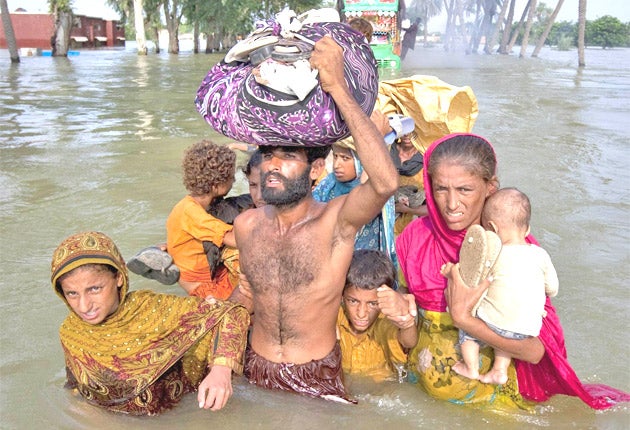Slow pace of aid forces Pakistan to take loan from World Bank

Your support helps us to tell the story
From reproductive rights to climate change to Big Tech, The Independent is on the ground when the story is developing. Whether it's investigating the financials of Elon Musk's pro-Trump PAC or producing our latest documentary, 'The A Word', which shines a light on the American women fighting for reproductive rights, we know how important it is to parse out the facts from the messaging.
At such a critical moment in US history, we need reporters on the ground. Your donation allows us to keep sending journalists to speak to both sides of the story.
The Independent is trusted by Americans across the entire political spectrum. And unlike many other quality news outlets, we choose not to lock Americans out of our reporting and analysis with paywalls. We believe quality journalism should be available to everyone, paid for by those who can afford it.
Your support makes all the difference.The world Bank has offered a $900m (£577m) loan to Pakistan to help with the country's flood recovery programme.
As aid donations to the beleaguered nation fall short of what is needed, the body said that funds would be diverted from ongoing and planned projects in the country. "We are re-prioritising to make the funds immediately available," said spokeswoman Mariam Altaf.
With widespread destruction of roads, bridges and other vital infrastructure, experts say that rebuilding could take many years and cost billions to complete. There are concerns that millions of people will need food aid, emergency shelter and medicine for weeks, if not months, to come. While the lives of an estimated 20 million people have been disrupted by the floods, agencies say that food and clean water have only so far been provided to 500,000. Anywhere between 3.5 million to 6 million children are said to be at risk from water-borne diseases.
The UN appealed last week for $459m that it said was required simply for immediate relief efforts, yet so far it has received just 40 per cent of that, with a further $43m pledged. "We would like our pledges to turn into cheques as soon as possible because the situation is getting very bad," said Maurizio Giuliano, a UN spokesman.
Aid agencies such as Oxfam have criticised the international community for not doing more. There is concern that allegations of corruption directed at the Pakistani authorities have dissuaded some from giving, or else from giving as much as they might. A number of countries, among them the UK, are directing their donations through the UN. In addition to money donated by the British Government, the Disaster and Emergency Committee said last night that £17m had been collected so far from individuals and corporate donors in Britain for flood relief. The money will be used by the DEC's member agencies, including ActionAid, Christian Aid and Save the Children.
The unprecedented floods, which killed around 1,600 people, have also created frustration and confusion. Millions of acres of agricultural land have been destroyed at the cost of up to $3bn, and ordinary people who already struggled to get by before the flood struck, are now confronted by a spike in food prices. The cost of vegetables and rice has already reportedly leapt.
Dealing with the spread of disease, especially among children, is also a pressing issue for aid groups. "We have a country which has endemic watery diarrhoea, endemic cholera, endemic upper respiratory infections and we have the conditions for much, much expanded problems," Daniel Toole, a senior official with the UN children's charity, UNICEF, told reporters in Islamabad. "We cannot spend pledges. We cannot buy purification tablets, we cannot support Pakistan with pledges. I urge the international community to urgently change pledges into cheques."
In Pakistan, the civilian authorities have faced widespread criticism for the government's limited response to the disaster. Yesterday, President Asif Ali Zardari, who was criticised for failing to cut short an overseas trip, admitted that the government had responded poorly. "Yes, the situation could have been better. Yes, the arrangements could have been made better. Yes, everything could have been better. Alas. If we could have those resources," he said. "We have to move forward despite whatever criticism we get."
What makes the situation even more perilous is that the devastation left by the flooding could yet get worse. Authorities in Sindh province said more flooding was expected over the next day or so.
Join our commenting forum
Join thought-provoking conversations, follow other Independent readers and see their replies
Comments